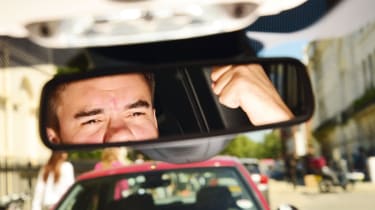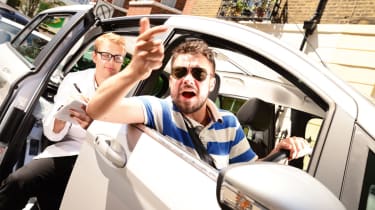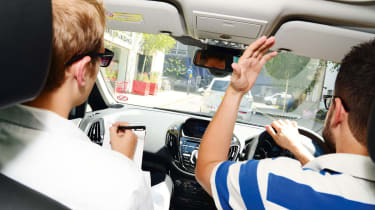Road Rage: the science behind it
What is road rage? If you've never experienced it on UK roads you're in a shrinking minority. The experts tell us how to beat it here...

Road rage is something that affects all drivers. At best, an incident can cast a black cloud on your day and negatively alter your mood; at worst, it can result in a verbal or physical confrontation, injury or something even more serious.
We may hear reports of the most serious cases in the news and see videos of them online, but there are disagreements between frustrated, angry and impatient motorists on a daily basis – making gestures, shouting and sounding horns.
In a recent survey conducted by black box insurer Ingenie, 70 per cent of respondents said they’d been a victim of road rage in the past 12 months. And although 65 per cent of those surveyed didn’t consider themselves to be a ‘road rager’, 85 per cent admitted to showing signs of road rage on occasion.

So what causes road rage? Can it be prevented and ‘coached’ out of drivers? Is there a specific type of road user more susceptible to experiencing it? Dr Lisa Dorn has devoted her career to researching and understanding such situations. A Reader in Driver Behaviour at Cranfield University in Bedford, she has managed research programmes on driver risk assessments, run courses at Cranfield on driver behaviour, and is co-editor of the book series ‘Human Factors in Road and Rail Safety’.
• GM app lets you scan the numberplate and text the driver
“When I started in this field, there were 6,000-7,000 deaths a year on UK roads,” says the psychologist. “Now that figure’s edging towards 1,700, which is still too high, but it’s improved significantly.
Cars with impressive and developing technology, and well engineered roads, mean that it’s safer to drive these days, of course. But I believe the way in which you need to continue to improve road safety is by educating drivers.”
Road rage: better driver education
So what is it that drives motorists to act in such a way? Well, people take risks that have nothing to do with their skills or knowledge; they take them because of their emotional condition, the situation they are in. There are, obviously, parallels with individual personality and driver behaviour.
“If you have a sensation-seeking character, looking for a buzz, that can often be expressed when driving if you’re in the relevant situation; in the country, open road, hilly, twisty roads, a sunny day,” says Lisa.
“It’s too tempting for the right character to take a risk and put their foot down to seek an exciting experience, as these are all contexts and conditions that act as triggers for that kind of behaviour.”
She continues: “If you’re an angry person, that can easily translate to aggressive behaviour. Put that into a traffic situation, and you have a driver who frequently experiences frustration and may intimidate other road users. The prospect of confrontation while driving is dangerous. The focus is not on the road but tunnelled down towards letting off steam.”

Changing that behaviour is the big challenge, according to Dorn. “The first thing to point out is that there is no silver bullet here; personalities don’t change overnight,” she insists. “There’s a psychology tradition to behavioural change and dealing with different personalities, and a methodology which is fairly well researched. You apply that to the driving concept.”
She goes on: “You need to develop the ability to self reflect on your personal driving style. If you think about it, once you’ve passed your test you never have to do anything again. There are so many times in your driving career where the risk to your performance is heightened.
If you have a baby you might be sleep deprived, there might be stresses at work, you could be going through a divorce, you have financial worries. All will have an impact on your alertness and driving.”
Road rage: 'self reflect' on your driving style
This approach requires the driver to consider how his or her performance could be affected, on any given day, by other factors and circumstances. The roadworthy condition of the vehicle is important, naturally, but what about the condition of the driver?
Is there anything that could compromise the safety of their handling of the vehicle? Running late? Tired? Distracted, still, by a conversation with a work colleague the day before? All of these things can have a negative impact, and compromise the mental state of the individual behind the wheel. Lisa recommends a driver asks themselves that pointed question before getting into the car: how is my driving going to be affected today?
Other expert advice includes looking for a safe opportunity to allow an impatient driver, who may be tailgating closely behind your vehicle, to overtake and pass; focusing on the present moment and your driving, rather than the destination; holding a hand up by way of apology to a fellow motorist if you’ve made an error while driving, and refraining from making eye contact with an aggressive driver in a confrontational situation.
Road rage: the causes
Why do some people get so enraged by another motorist’s behaviour on the road? “It’s like looking through a distorted lens, and the person in front of that distorted lens becomes someone who is trying to stop them from achieving their goal,” explains Lisa. “And some people really take it personally.
“Mostly people are just being human, maybe being a bit thoughtless, but not trying to take risks deliberately. But that distorted view then gets established over time, coupled with personality and emotional factors, and some people are almost waiting for a situation to happen. People get angry and have difficulty controlling their impulses, and let off steam – they almost have a tunnel vision and fire off an outburst of some sort.
“But when someone is angered, that stress rattles them and means they can’t process traffic data as effectively. That affects driving performance.” Road rage and angry behaviour isn’t exclusive to a gender or age group. But men are more likely to be involved in an incident, while youngsters can struggle to keep cool.

“Males have a significantly higher level of aggression, although females are becoming more aggressive – maybe because they’re increasingly joining in with male culture and are less bound by traditional roles,” says Lisa. “By and large, young women are far safer and have less driving aggression issues than males.”
So, the next time you get in your car, give due consideration to your own attention and performance on the road. Ensure your driving is as safe as it can be, and don’t let your frustrations get the better of you. After all, staying calm is the best way of staying safe.
The driving doctor’s tips on avoiding road rage
By Paul Ripley
Road rage is an endemic activity that comes under the banners of road hostility, driver aggression and competition for road space. It’s about unhealthy attitudes and unruly behaviour.
To avoid it, you need more control over your emotions so you’re on top of what happens and don’t let it boil over into something you’ll regret. Think more about what counts in your life and remember, you never know who you’re dealing with. Working on your discipline is the best way not to get involved with other ill-tempered drivers.
A bad attitude is the critical factor in how you react, and if you can’t control yourself, you’re more likely to seek retribution through retaliation. Lack of control is often the cause of confrontation and crashes. If you’re in control, you can take yourself out of a potentially dangerous situation.
Remember: Safety is not a skill set, it’s a mindset.
Have you ever been on the giving or receiving end of road rage? Tell us all about it in the comments section below...
Find a car with the experts


